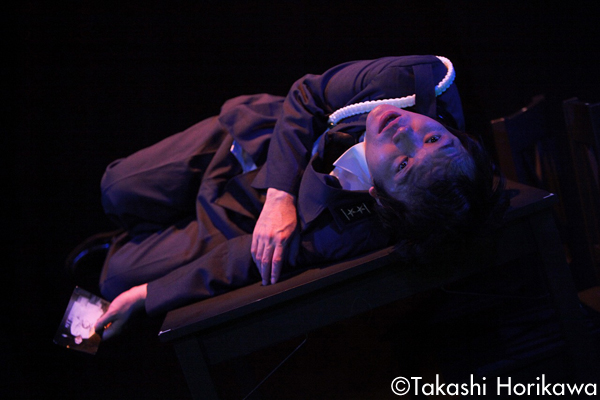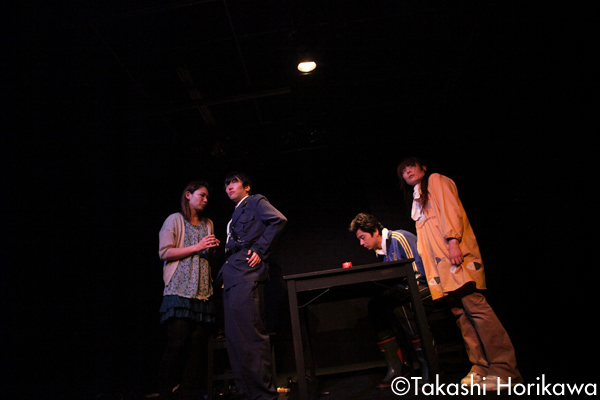The play opens with the setting at a police box on a late night in May. A woman has rushed in carrying her shoes in both hands. The young policeman asks her what has happened. The woman’s name is Yukari and it appears that she has attempted to kill herself by drowning. After calming down she leaves. After this she will return from time to time to have the policeman listen to her stories.
The policeman is out on his rounds. Passing through a field by the shore, he comes across a town assemblyman named Akamatsu, who is picking up litter and putting it in the compost bag he carries. When the policeman greets him with words of encouragement, assemblyman Akamatsu replies in a bright voice, saying that doing things for the people of the community gives meaning to his life.
The policeman gazes at the assemblyman with admiration. He too wishes to work for the good of the people as a police officer. In his simple way he hopes to become the light, the shining sun of the town.
A married couple that live near the shore are talking together in a mood that seems lonely and disconsolate. They have a small fish-farming operation, but they are unable to get a good price for the young yellowtail fish they are raising and are barely making a living. They have been refused a loan to invest in another crop of fish and things are looking hopeless for them.
The wife tells her husband about the dream she had the night before.
Up in the hills there are crows sitting out the rain. Some of the crows had their eyes open and some had them closed. To her, the ones with their eyes closed appeared to be deep in contemplation, while those with their eyes open were just sitting with their minds blank, thinking of nothing. However, to other people it might appear to be just the opposite. The wife looked carefully and then objected to what appeared to be the strongman among the crows. But, nothing changed. A strongman remains a strongman, she says.
The husband comforts his wife, saying that if he had been there he would have respected her opinion and taken action. They appear to be a harmonious couple.
The policeman tends to get depressed and to figure out the cause of his state he is thinking about how he handles his job. This leads him to act out a fictitious scene in which he is making an arrest. Always when he does this an image of a detestable Mickey Mouse appears
He mumbles, “You are a black mouse, aren’t you, Mickey?” Then the policeman remembers the song about a black mouse that his late grandmother used to sing when she was raising him; but he gets some of the lines wrong. While doing his rounds the policeman is once again feels a fit of depression coming on, but he can’t find the cause.
All of the characters in this play have, in different ways, some form of unidentifiable anxiety that haunts them, and they agonize about their inability to find a way out of it.
The policeman passes by a rice paddy and notices suspicious figures in it. It is a woman with her face buried in a man’s groin. The woman is Yukari and the man is the young assemblyman, Akamatsu.
Yukari had said that despite her devotion to her lover, she feels she is not being loved in return. The policeman begins to worry about Yukari’s love affair.
The assemblyman Akamatsu approaches the fish-farming couple as they walk through a park. He asks them if they have any concerns and if there is anything he can do for them, and he hands them one of his campaign leaflets. In fact, the person who has refused to give the couple a loan for their fish-farming business is Akamatsu’s uncle, but he seems completely unaware of that fact.
Assemblyman Akamatsu goes on delivering his pitch to the couple about how much he is doing for the people of the community. Akamatsu talks about how hard he is working on behalf of some abstract “everyone,” but when confronted with real people in need, he treats them coldly and turns out to be just a mundane, selfish person.
The couple begin to feel disdain for the assemblyman.
In his police box late at night, the policeman is thinking that even if a person has the desire to do something to help others, if one doesn’t have true compassion deep in one’s heart, one will never be able to do anything to actually help people. Several black Mickey mice appear.
At dawn, the policeman takes a shovel and runs up the hill behind the police box. While doing a dance of prayer, he digs a hole in the ground and buries his face in it. He decides he is going to become a shining sun for the people of the town.
But, the path to becoming a sun that he decides on is a fire. Since people in a town where nothing happens are not really conscious of happiness, he decides that he will become the sun for the town by putting out a fire that Yukari has started. That is his reasoning.
The policeman’s righteousness gets twisted in this way to a form of evil, as he plans to entangle Yukari in his plot with threats about her affair with her lover.
The couple and the policeman meet by chance on the street and make small talk about how noisy the town has gotten with the election campaigners raising a ruckus. When the policeman says that he also wishes to do something for the people, the couple asks if he will lend them money. The policeman shrinks from the request but nonetheless offers them 1,000 yen ($10) and tells them to get something to eat with it. He apologizes that he has no money and this is all he can offer.
The couple thanks him, saying that he is the only one who listens to their troubles. They complain about not being able to count on the government and voice their resentment at the assemblymen’s lack of ingenuity.
Rain begins to fall, and the policeman and the couple and Yukari, who has come to visit the policeman again all sit out the rain in the police box. Suddenly the assemblyman Akamatsu comes in to the police box, having followed Yukari.
When Akamatsu sees the collection of people inside, he unconsciously mumble, “Bunch of rabble,” but is quick to excuse himself and act graciously.
When Akamatsu and Yukari are alone he tries to get her face in his groin again, but she just gives his manhood a rough squeeze and decides she is going to break up with him.
The policeman wants to become a sun for the town but he is thinking that helping some will always be at the sacrifice of others, and it is impossible to help everyone. He dances in prayer but it doesn’t help, and he is beginning to be overcome with a sense of despair.
The fish-faming couple has asked assemblyman Akamatsu to come and meet them at the shore. They ask the assemblyman to persuade his uncle to give them a loan for their business. But, Akamatsu says he is too busy with the election campaign to do anything right now. Instead he stuffs a 10,000-yen ($100) bill in their hands. They beg him to listen to their request, but he refuses and walks off after throwing another 10,000-yen bill on the ground.
The couple gets on a long-distance bus headed for Osaka. They used the 20,000 yen from the assemblyman to buy the bus tickets. When they get to Osaka they put up a banner in the bus rotary saying, “Assemblyman Akamatsu is trying to buy votes. He detests the weak. He called us ‘Rabble’.” A crowd begins to gather around their banner.
The policeman lead Yukari toward the rice paddies. They find that assemblyman Akamatsu has hung himself to death there. It would appear that he hung himself because he was probably going to lose the election due to the fish-farming couple’s protest, but nothing can be said for sure.
Yukari says, “How could he talk about helping people when he had no concern for people’s feelings,” and then she walks off.
The policeman is left alone to take down the body.




